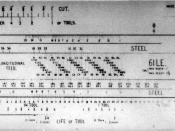Management is regarded as an art that often makes or break a business. Management theories and practices that we study and use today were the outcome of revolutionary changes of the past triggering the need for new methods. Of these, scientific management was one key concept that shifted the paradigms of industries for the better just as much as it attracted controversy and its fair share of critics. It was the driving force behind the Industrial Revolution and is just as relevant today. Scientific management can be connoted as the systematic study of relationships between people and tasks for the purpose of redesigning the work process to increase efficiency (Jones, George & Hill, 2000).
When Frederick Winslow Taylor, popularly dubbed the 'father of scientific management', joined Midvale Steel Company in 1878, he "discovered that production and pay were poor, inefficiency and waste were prevalent, and most companies had tremendous unused potential".
The conclusion was that "management decisions were unsystematic and that no research to determine the best means of production existed" (Bateman & Snell, 2004). He thus initiated scientific management, conjuring key principles that gradually evolved over years of extensive study of task and supervisory practices and how they could be combined for improved performance. The "basic elements of scientific management put forth by Taylor were the following:â¢Determine the 'one best way' to do each job through precise, objective measurementâ¢Select the 'best persons' for the jobâ¢Train the 'best person' in the most efficient methods of performing the tasksâ¢Provide sufficient monetary incentive to the workers to perform the task correctly and meet a defined hourly or daily target rate of output" (Black & Porter, 2000)These principles brought about management practices such as the 'one best way', 'first-class worker' and 'differential piece rates' which Taylor believed would eradicate the soldiering of...


